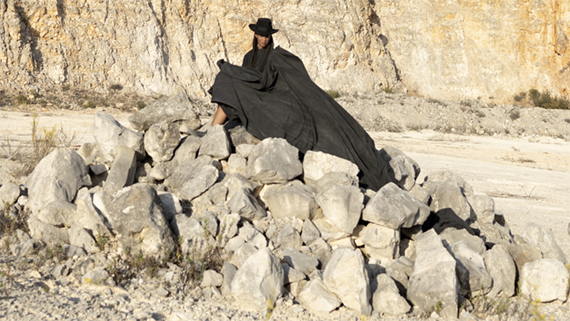
Grada Kilomba »
Opera to a Black Venus
What would the bottom of the ocean tell us tomorrow, if emptied of water today?
Exhibition: 20 Nov 2024 – 31 Mar 2025

Museo Nacional Centro de Arte Reina Sofia (MNCARS)
Santa Isabel, 52
28012 Madrid
+34 91-4675062
direccion.mncars@cars.mcu.es
www.museoreinasofia.es
Mon, Wed-Sat 10-21 . Sun 10-19
The solo exhibition
Opera to a Black Venus
, devoted to the Berlin based Portuguese artist Grada Kilomba (Lisbon, 1968), assembles a selection of artworks, denoting the most complete presentation of her works to date in Spain.
Kilomba is best known for her unique practice of storytelling, in which she gives body, voice, form and movement to her own writings, using: performance, staged reading, dance, video, sculpture, installation and sound landscapes. With a subversive and poetic imagery, her work draws on memory, trauma, gender and postcolonialism, interrogating concepts of violence and repetition. “What stories are told? Where are they told? How are they told? And told by whom?” are constant questions in Kilomba’s body of work.
Her work has been described as a new postcolonial minimalism, in which multiple and complex languages blur the boundaries between disciplines. With a robust substructure in psychoanalysis and philosophy, in addition to her extensive work as a researcher, she analyses the dominant systems of knowledge production, putting forward a process of unlearning current hegemonic narratives.
Opera to a Black Venus
(2024)
adopts the title of an ambitious new project, which the artist has developed over the last two years as a result of a collaboration between the Museo Reina Sofía and the Staatliche Kunsthalle Baden-Baden in Germany. Kilomba imagines a futuristic scenario of an arid landscape, where the sea has disappeared, revealing the traces of human existence. In the eyes of the artist, the ocean is the burial ground for millions of lives lost throughout centuries - from slave trade, to colonialism, to war, climate change and forced migration. “What would the bottom of the ocean tell us tomorrow, if emptied of water today?” asks Kilomba.
The work
Opera to a Black Venus
(2024 - ongoing), is a large-scale video installation staging the first part of a contemporary Opera, dedicated to a
Black Venus
, who inhabits the grounds of the ocean and who becomes the oracle of narratives of remembrance and resilience.
As it is common to the artist’s practice, she worked with communities from the periphery of Lisbon, where she grew up: from sopranos, contraltos and tenors to percussionists and ballet dancers, all become the protagonists of this storytelling. A compelling choreography moves towards our eyes, as if underwater, to the sound of winds, voices and a four-handed piano improvisation by the artist and her young daughter - presented as a
requiem
or a lament to those who have succumbed to the tides of global waters.
Diving beneath the waves, Kilomba guides the audience through other large scale installations using poetry and materials such as fabric, burnt wood, stone, sand and glass, as scenarios to this contemporary opera:
18 Verses
(2022), the cartography of a shipwreck embraced by an ensemble of powerful voices and instrumental sounds;
Sounds of Water
(2023), a poem in neon lights reveals a poignant call;
Labyrinth
(2024), a monumental spatial textile installation, alluding to the im-possible paths and routes of liberation; and
Compressed Time
(2024), where the striking contrast between solid stones and sleek black cube invites the viewers to contemplate the intersection of past injustices and future possibilities.
Moreover, in this solo exhibition two other moments of the artist’s career are presented: the acclaimed video installation
A Word of Illusions
(2017-2019), composed of the performance of three Greek mythologies translated into postcolonial times:
Illusions Vol. I, Narcissus and Echo
(2017), dedicated to the politics of misrepresentation and invisibility;
Illusions Vol. II, Oedipus
(2018), dedicated to the politics of violence and genocide; and
Illusions, Vol. III, Antigone
(2019), dedicated to politics of remembrance and mourning.
And an earlier moment, in which her own writings become performative:
The Desire Project
(2016), a three-channel video installation in which words become moving images and drumming a form of narrative;
Table of Goods
(2017), an installation composed of soil, sugar, coffee, cocoa and chocolate, mesmerising cyclical exploitation.